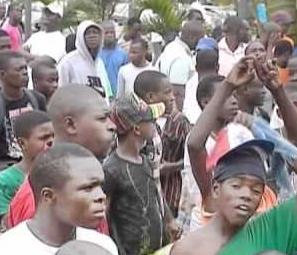Angolan Elections 2012: beer and circuses no longer enough – By Claudia Gastrow


Youth protests in Luanda are a signal of a greater self-confidence and willingness to criticise the incumbent MPLA regime.
It is election month in Luanda and the city is awash with billboards, posters, and illuminated displays of President José Eduardo dos Santos, leaving little to the imagination as to who is in charge of the show. However, the mixture of flashy construction and heavy-handed control that has characterized post-conflict MPLA rule is no longer enough to distract people from the weaknesses that mar the party’s track record. In Angola’s capital few people doubt that the MPLA will win the election. However, in contrast to 2008, growing numbers of Angolans are questioning the legitimacy of this pending victory. It is ten years since the war ended and the MPLA’s claims that it is the only party capable of governing the country are ringing increasingly hollow.
Over the last year, especially since the president’s disastrous April 2011 speech, in which he claimed that poverty and corruption could not be blamed on the MPLA, open criticism of the party and especially Dos Santos has become increasingly common. The most obvious sign of dissatisfaction have been the small but significant youth protests demanding the president’s exit. However, quotidian displays of dissent are the most significant indications that the MPLA’s popularity has declined and that those who never liked the party to begin with have become more outspoken. Gone are the days when Luandans avoided political discussions. The urbanscape is now characterized by anti-regime hip-hop blasting from the speakers of Luanda’s candongeiros, laughter as someone describes leading politicians as gatunos (criminals), and jokes that MPLA regalia has to be distributed for free because it was bought using state funds.
The MPLA, of course, still has its dedicated supporters. Since campaigning began on the 1 August, there have been city-wide maratonas, MPLA sponsored parties where music blares and beer flows – an easy way, critics would say, of buying off the urban youth. However, not all voters need to be bought with beer. Many, especially those who remember the disastrous 1992 elections, fear the repercussions of a radical change in the political sphere, whilst others firmly believe that the MPLA is responsible for the peace the country has enjoyed since 2002. The emerging middle-class – the majority of whom depend on the public service and the oil industry for their lifestyles – are also unlikely to hope for a significant transformation of the status quo. Nevertheless, even supporters agree that the MPLA should win by a smaller margin, arguing that its overwhelming victory in 2008 (81 percent of the vote) has led to complacency and corruption.
The MPLA is trying to convince voters and the outside world that there is no alternative to it, using the construction works that the government has sponsored over the last ten years as proof of its capacity. However, the increasing support for other parties is evidence to the contrary. Amongst the urban poor, UNITA and a new party, CASA-CE, formed in early 2012 after Abel Chivukuvuku broke away from UNITA, have gained legitimacy. Both parties appeal to young Angolans and those fed up with the MPLA.
CASA-CE has cleverly pulled in some of the charismatic figures that have been associated with recent protests against the president, and Luaty Beirí£o, one of the unofficial leaders of the anti-regime youth movement has openly declared his intention to vote UNITA. UNITA’s strength was evident when it was able to pull several thousand supporters on the 25 August to protest in Luanda against fraud and irregularities in the preparation of the election. The opposition parties have never been as well positioned as now.
Unfortunately, the widespread belief that the results will be fraudulent works in favour of the MPLA as it leads to voter apathy. A common cause of this is the view that political parties have already agreed on the results behind the scenes, making the election nothing but a very expensive show. Many people assume that the MPLA created most of the opposition parties in order to create the illusion of multiparty democracy. The most cynical voters suspect that even UNITA and CASA-CE may have been bought out by the MPLA in return for promises of guaranteed seats in the new parliament.
A large number of people believe the organization of the election is also flawed. Rumours abound of dead people being registered as voters, extra ballots being printed, and more people being registered to vote in certain villages than live there. Angolans suspect that the MPLA has manipulated the voter lists and will control the release of results so that an MPLA victory is predetermined. This has only been exacerbated by the difficulties faced by observers in acquiring accreditation. Most credible local civil society groups have been not been accredited, and the EU is not sending an official mission, meaning that observation is left to SADC and the AU.
Angolans have little faith in the international community, not only because its presence will be thin on the ground, but also because they believe that most countries, more interested in protecting their oil interests than promoting democracy, will rubber-stamp the results. One of the biggest dangers to Angolan democracy is the widespread belief that given the power of the MPLA, democracy is simply not possible in Angola. Nevertheless, an MPLA whitewash is unlikely to be accepted as complacently as previously.
Should the MPLA emerge with anywhere near the percentage of the vote that it received in the 2008 election there is likely to be criticism of the results in Angola’s principle urban areas. However, what this actually means in practice is difficult to predict. Much will depend on the initial expressions of discontent and the state’s reactions to them. Ordinary Angolans are still fearful of a return to war and will do much to avoid any confrontations that could lead to violence. In contrast, the state’s recent actions towards protestors indicate that it is capable of using force against civilians. What is clear is that the 2008 elections were a turning point for Angola. Angolans no longer accept fraud, corruption, and repression as simply the way the country has to be. Ten years of peace has led to a population that demands more accountability, equality, and democracy, a tendency that should only be expected to grow with time. Free beer is no longer enough to secure a vote.
Claudia Gastrow is a PhD Candidate in the Department of Anthropology, University of Chicago. She is currently based in Luanda where she is conducting fieldwork for her thesis, “Negotiated Settlements: Housing and Citizenship in Luanda, Angola.” Her research was made possible by the support of the Wenner-Gren Foundation Dissertation Fieldwork Grant, the National Science Foundation Doctoral Dissertation Improvement Grant, the Social Science Research Council’s International Dissertation Research Fellowship, with funds provided by the Andrew Mellon Foundation.







[…] of observers. Anthropologist Claudia Gastrow wrote on the eve of the vote in her post “Beer and Circuses No Longer Enough†Most credible local civil society groups have been not been accredited, and the EU is not […]
Hi, I’m journalist for Le Monde, rightnow in Luanda covering elections. Please, tell me how to get in touch with Claudia. Best regards. Ch
[…] A antropóloga Claudia Gastrow escreveu na véspera das eleições um post intitulado “Beer and Circuses No Longer Enough†(Cerveja e circo já não são suficientes) [en]: Most credible local civil society groups have […]